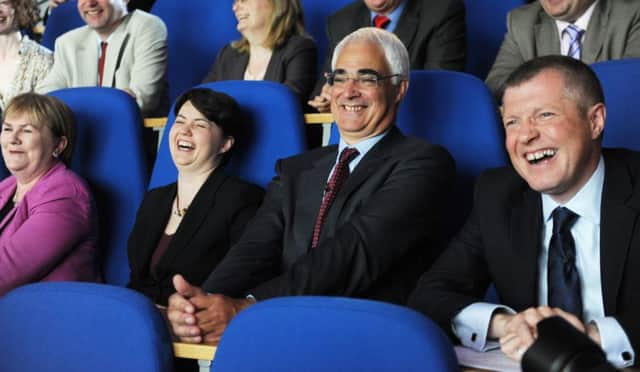Scottish independence: Economic case won - Darling


Alistair Darling says Nationalists have all but “given up” on the economic argument for independence as one leading expert warned this week that polls effectively have not budged in the past few years.
But Nationalists insisted last night that sticking with the Westminster system will plunge Scotland into further “austerity and poverty” while a Yes vote can offer a different path.
Advertisement
Hide AdAdvertisement
Hide AdMr Darling said the “colossal” costs of independence are getting through to voters after Keith Cochrane, chief executive of the Weir group, warned of an “investment hiatus” after a Yes vote.
“The economic argument is one the Nationalists have almost given up making,” Mr Darling said. “They’re running out of time to make it, as well. I think it is cutting through to people.
“People are aware of the fact that what you would be voting for is deep uncertainty.”
The SNP government’s failure to set out what currency Scots would use – if sharing the pound in a formal currency union with the rest of the UK is ruled out – is at the heart of voter concerns, Mr Darling said.
“He (Alex Salmond) has got to have a Plan B,” Mr Darling said.
“We’re being asked to go to the polls in 12 weeks’ time, not knowing what our savings would be worth, how much our loans would cost, what sort of coins we have in our pocket. This is not an idle question – it’s absolutely central to our future.”
Mark Diffley, of Ipsos Mori, told a conference of finance leaders in Edinburgh this week that the No camp has a “60-40” lead in its latest poll, which is largely unmoved from the same point two-and-a-half years ago.
Advertisement
Hide AdAdvertisement
Hide AdMr Darling added: “At a time when we’re coming out of one of the deepest recessions we’ve seen in the last 100 years, to have all these uncertainties, no wonder people are saying No thanks.
“The economic argument is one of the strongest arguments for saying we’re better off as part of the UK. At a very basic level, Scotland sells more to the rest of the UK than it does to the rest of the world put together and it makes no sense to break away from that.
“It makes no sense for all the uncertainties that come in relation to Europe, from having a different tax system and regulatory system. All these things are very bad for Scotland and bad for jobs.”
But Nationalist MSP Bob Doris insisted that Tory welfare cuts are having a “disastrous impact” on people in Scotland.
He pointed to a report by the Poverty Truth Commission last week indicating that more than half of people living in poverty in Scotland are in working households. This, he said, “shows the need for action to tackle low pay – and we need the full powers of independence to do this.
“But perhaps the saddest aspect of this report is the finding that people are increasingly being blamed for being poor – Westminster’s rhetoric and race to the Right on welfare is clearly having an impact on people who are already suffering.
“While Westminster pushes people in Scotland into poverty and then blames them for being there, a Yes vote means that we can take a different path.
“With the full powers of independence, we can take real action to tackle poverty – ensuring a fair day’s wage for people in work, and ensuring that our welfare system supports rather than penalises vulnerable people.”